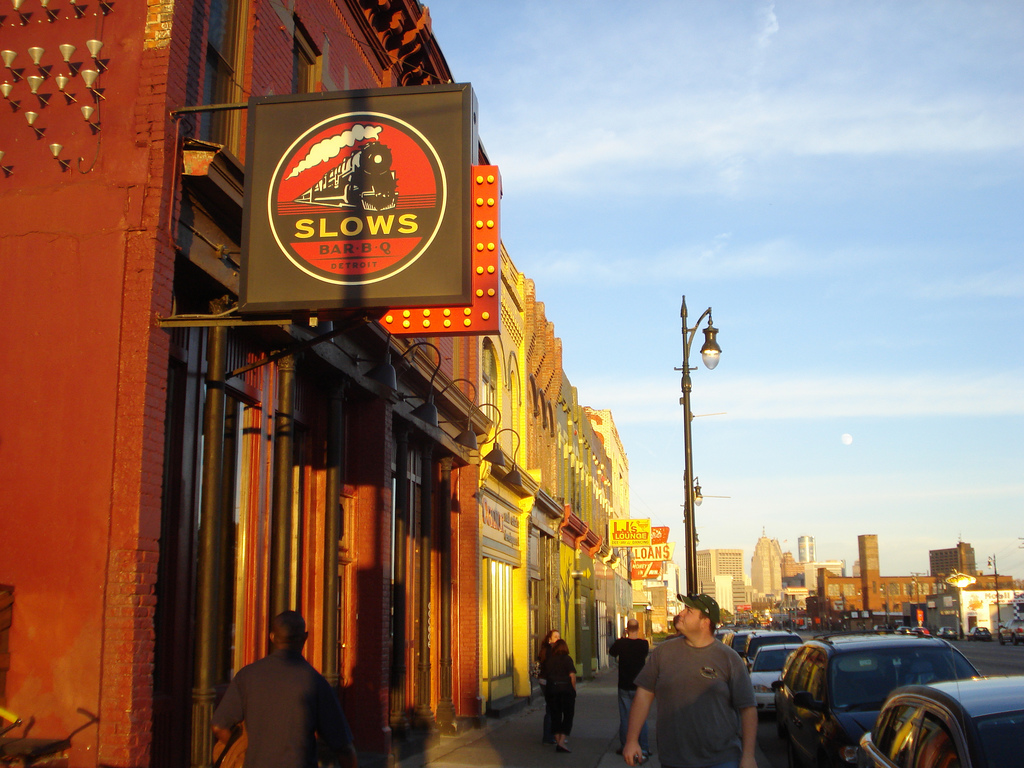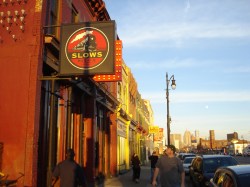
Andrew McFarlaneSlows in central Detroit.
I travel a good bit for my job. It may sound glamorous, but it can be quite grueling: long days in conference halls and meeting rooms tend to suck my brain dry. My consolation comes when I hit the streets in search of food. Over the past year, I’ve had terrific meals at unique, local-minded restaurants from Austin to Seattle to Boston. I’m usually too worn out from the meeting-world to write much about them. (Exception: a paean to sandwich shops in Brooklyn and New Orleans; and a tribute to the street food at San Francisco’s Ferry Plaza Market.)
The holiday lull has given me the chance to reflect on another good year in road grub. On the following pages I rave about my favorites, in no particular order.
Slows Bar-B-Q
Detroit, Mich.
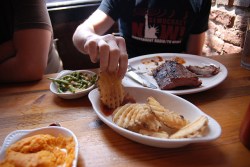
Jonathan McintoshHousemade potato chips.
Not far from downtown, on what was until recently just another abandoned block, Slows Bar-B-Q brings a burst of fabulousness and community spirit to central Detroit. The place is owned and run by Phil Cooley, who grew up in the city’s suburbs before heading off to New York to launch a modeling career. He retained a passion for Detroit’s crumbling grandeur and a vision for the bustling place it could become again. Returning to launch Slow’s in 2005, he’s created a relaxed but buzzy atmosphere that appeals to the city’s new class of hipsters — black and white — along with suburbanites fleeing stripmall world. The decor is urban-rustic: upcycled wood and metal from all over the neighborhood. The menu I’ll sum up like this: you can get a delectable barbecue sandwich, from pulled Niman Ranch pork, for $8. (My brother, vegetarian, swears by the mac ‘n’ cheese.) The beer list is splendid. I love this place.
Don’t miss: Split “The Big Three” — pulled pork, pulled chicken, and sliced brisket — with a friend.
24 Diner
Austin, Tex.

Megan Myers24 Diner scratches the Austin locavore itch.
24 Diner is a kind of dream casual restaurant. It never closes. Prices are moderate; ingredients are top-notch and often sourced from nearby; and execution is deft. The menu is focused — it fits on a page — but manages to range from comfort food (burgers) to hippie food (chard leaves stuffed with wheat berries) to fancy specials. So at some tables you’ll find neighborhood folks enjoying chicken-and-waffles and beers, and dressed-up couples having steak and wine at others. Breakfast (really good breakfast) is served all day. The beer and wine lists [PDF] are rock-solid. The room is sleek, airy, and typically packed with people joyfully getting their grub on. I grew up in Austin and still visit annually. The town has long needed a mid-priced, fun restaurant that uses good ingredients. Now it has one.
Don’t miss: The roasted banana and brown sugar milkshake.
Feast
Charlottesville, Va.
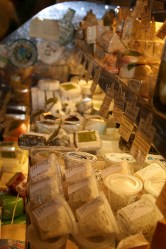
Spicy BearThe cheese section at Feast is quite a spread.
In an era of increasing giantism among food retailers — with Walmart dominating the conventional market and Whole Foods the “natural” side — locally owned and tiny Feast is a throwback. Feast is stuffed with beautifully curated foodstuffs, much of it sourced from the surrounding Virginia countryside. It also runs a terrific deli featuring sandwiches worth rhapsodizing over — and speaking of the surrounding countryside, the chicken in the chicken salad comes from Joel Salatin’s celebrated Polyface Farm.
Don’t miss: Grab sandwiches and other provisions and a bottle of Abermarle CiderWorks‘ fabulous Royal Pippen cider, and get thee to Monticello, Thomas Jefferson’s mansion, for a picnic in the celebrated gardens. Raise a glass in memory of the slaves who tended those fields.
Sitka and Spruce
Seattle, Wash.
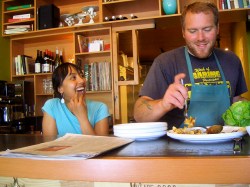
TonxMatt Dillon (right) of Sitka & Spruce is picking up the Alice Waters torch.
My best restaurant meal of 2010 was lunch at Sitka and Spruce, in Seattle’s new Melrose Market. Melrose’s home is a car-mechanic shop built in the ’20s that has been transformed into a locavore temple. It features a sandwich shop, a wine bar, a local-meat butcher, and nestled in the back corner under high windows that (weather permitting) let the sun stream in, Sitka and Spruce. The day I visited, the sun was in full force, illuminating a long butcher table offering communal seating on one half, and on the other, the mise en place and staging area for the kitchen. On the cook’s side, the table terminates at the mouth of a great big wood-fired oven. Presiding over the kitchen was a robust bearded fellow, serious but with a Falstaffian gleam in his eye. He turned out to be chef-owner Matt Dillon. (No, not the Flamingo Kid one.) His food was terrific. The menu is more or less straight-ahead Mediterranean, but refined and concentrated in flavor and yet absolutely light. It tasted healthy, but not in the way of banal “health food,” full of sprouts and Bragg’s amino acids. I left the place feeling like something had happened to me — the way that a reading a great novel is an experience, even though you’ve done nothing but sit silently on your ass.
My friend and I ordered a variety of small plates. Everything was on point, but two dishes stand out. The first was Middle Eastern-style dried fava beans, cooked down into a paste, seasoned with garlic and lemon, and topped with an over-easy fried egg. I love dried favas, but they can often be heavy. Under Dillon’s care, they were feather-light, as if the paste had been whisked to incorporate air. The seasoning was gorgeous: you couldn’t taste salt in it, but nor would you dream of adding any. And the way the warm egg yolk interacted with the favas: nirvana. The second dish, rabbit /snap pea salad, also sounds heavy but even more miraculously was anything but. The rabbit, which I suspect was poached in olive oil, came shredded, and was moist and earthy against the snap of the peas and the tang of lemon. Mint, which I always forget to use in my cooking, added freshness and a little sting. Again, perfect seasoning. As for wine, the list concentrates on the kind of subtle, unmanipulated stuff I adore. (See my screed on “natural wine.”) I don’t want to be too effusive, but I did leave Sitka and Spruce thinking that Dillon represents the next vanguard in the tradition of ingredients-obsessed cooking established a generation ago by Alice Waters. Dillon takes the southern European techniques embraced by Waters and refines them into something new, original, and mind-bogglingly light — and yet still utterly substantial.
Don’t miss: Anything.
Terroir NYC
New York City
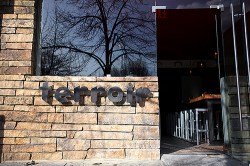
Zagat BuzzNew York City’s “elitist wine bar for everyone.”
Speaking of natural wine, there’s a rustic East Village hole in the wall called Terroir NYC devoted to it. (There’s also a branch in Tribeca.) Hailing itself as the “elitist wine bar for everyone,” Terroir has a wacky, pop culture-soaked aesthetic. The wine list offers jokes on the news of the day along with pages of distinctive wines. On the menu, small plates, overseen by chef Marco Canora, combine simple technique with pristine ingredients. In short, my dream wine bar.
Don’t miss: Panino of roast pork loin with rapini and garlic aiolli, with a glass of whatever the guy behind the bar recommends.

